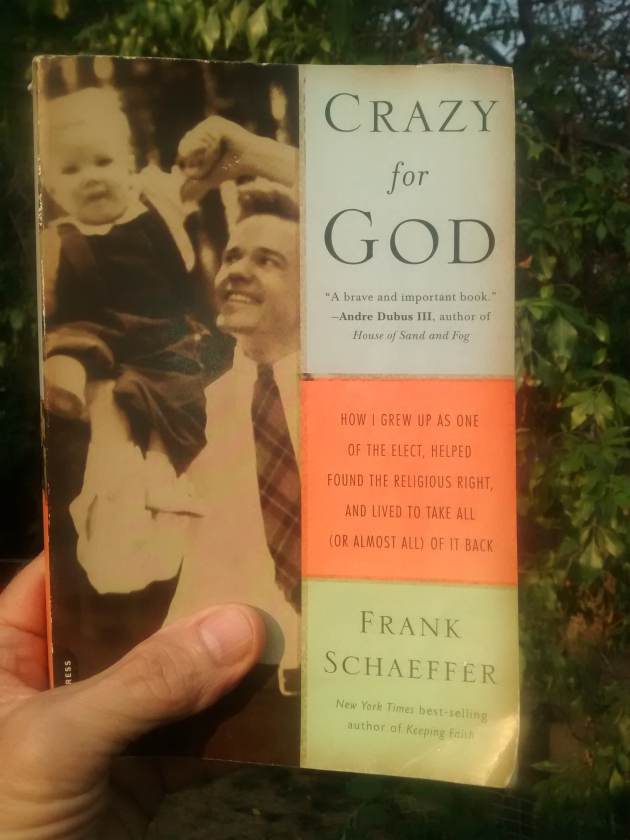Here’s a warning: Don't see this movie if you can’t stand violence or want clarity about who the good and bad guys would be in…
“Crazy for God” Review

When I’m sorry a book ends, I know it was good. I liked Frank Schaffer’s Crazy for God. His honesty,
Frank Schaffer lives into his name – he’s frank. “Honesty is the only thing that is satisfying about writing,” he writes. His writing is easy and honest, witty and wise. He tells it like it was and is. He grew up in the Christian family central to evangelicals going Republican. He loved his father and mother’s fanatical passion for evangelism, but grew sick of pretense and hypocrisy, especially that of slick preachers and politicians veering decent believers into supporting indecent, right-wingers. Some may accuse him of being an infidel to their Christian cause; I think he rescues it.
Frank’s father Francis was once a star in the evangelical world. He preached well and widely, weaving art into religion, explaining Bob Dylan songs and other cultural trends in Christian terms. Their house in Switzerland was a mecca for Christians and artists. Francis was sought out by many celebrities of the 60s and 70s – from Timothy Leary to Billy Graham, from Salvador Dali to Princess Dianna. He was a bit of a guru, preaching Jesus to the hippies. For him, art and intelligence were not antithetical to Christianity. Frank’s mother also evangelized but wasn’t narrow. She’d read Mark Twain to her boy along with the Bible and didn’t prevent him from seeing nudity in great art.
Frank writes of his boyhood with charming honesty. I imagine many Christians would be embarrassed at his writing about “wanking” with other boys and his revealing the behind-the-scenes reality of various Christian stars. Frank was the heir apparent of his father Francis, on which he easily could have capitalized. Instead he went on to be an author, artist, and film-maker in his own right. Crazy for God makes me want to read his novel, Portofino.
Frank regrets how his anti-abortion stance became the key for Reagan, the Bushes, Dr. Dobson (of Focus on the Family), and Reverend Pat Robertson to push that issue into the contentious divisiveness it became and still is. Frank regrets goading his tolerant father into pro-life extremes. Aided by the ardent pro-lifer, Surgeon General C. Everett Koop, right-wing Catholic Bishop Fulton J. Sheen, and supply-side economics wonk Jack Kemp and his wife, the pro-life stance went from being a narrow Catholic issue to a widespread Republican one. With President Trump’s quip that women who abort should be punished and his stacking the Supreme Court with opponents of abortion rights, the difficult issue is again in our face.
(To my mind, a woman’s decision whether to end her pregnancy isn’t the freedom of choice; it is the burden of choice. A fertilized ovum in a mother isn’t a mere nothing, nor is it a child or person. Difficult though it is, it is more the mother’s business than others. I doubt many would vote to outlaw abortion if they were then held financially responsible to help support the child.)
While Frank Schaffer regrets how the Republican Party co-opted the issue, he doesn’t spare the Democrats and NARAL. At first they ignored Christian pro-lifers, and then they belittled them, portraying them as crazy extremists. He writes “the pro-choice forces were so hubristically aggressive when belittling their opponents that they alienated everyone who even mildly questioned their position. They drove people to us… [T]hey might as well have been working to help the Republicans take Congress and the White House.” Dismissiveness aggravated defensiveness and provoked adamancy. When sides get bifurcated, such cyclical dynamics can lock both in contention.
(When sides form, each sees the worst in the other – and elicits it. I have long noticed how attacking with defensiveness can be both deluded and effective. We once created “no-fly zones” in Iraq that only we flew in, shooting any radar daring to watch. We were afraid of their alleged weapons of mass destruction while invading with gobs of our actual weapons – Shock and Awe galore. Attacking with defensiveness is a sort of preemptive reactionary response, accusing the other while initiating an attack. Invasions create the insurgents we then defend ourselves from. Consider the rise of gun-wielding in our culture lately, more and more defending themselves from guns with guns.)
Much like the BBC’s Civilization and Jacob Bronowski’s The Ascent of Man, Frank and his father created their own Christian film series. How Should We Then Live? claiming modern art, culture, freedom and democracy were based in the Christian tradition and “that foundation was under attack from humanist and secular ideas and elites… because there were no longer absolutes that we could all agree on to guarantee them.”
Even though that defensive attitude was felt then and still, there is less need for such bitter bifurcation in our mutual culture as is supposed and accused. Frank Schaffer himself embodies the virtues and values common to both Christian and humanistic people. Both agree we shouldn’t lie, steal, injure and kill. Such moral ethics is common in humanity and is not owned exclusively by any tradition or religion that shares in it.
Moreover, many humanistic advances came in spite of the church and evasion of it, not with its blessing. Burning non-believers to death on orders from king, pope or imam is offensive to modern Christians and secularists alike, I’d guess Schaffer would agree. Equality, inherent worth, inclusiveness and participatory democracy has some roots in Christian theology, but were also impeded by it.
Critical thinking is not praised and practiced from the pulpits, especially the more fundamentalist ones. Reason, logic and science annoy people’s beliefs. The fairly new reality humanity must deal with is far vaster and smaller, longer-lasting and brief than we had imagined. Life is more interrelated and interdependent than we recently knew. Our Eden isn’t a mere few thousand years old; it is billions of years in the making and is fragile in the face of our sudden technologies. This disrupts the quaint beliefs in the Bible as historically and factually authoritative. Evolution isn’t an attack on Christianity, but many Christians feel it is, resent it, and attack back. Are accusations of a culture war on Christianity really attacks?
Witness our new Secretary of Education Betsy DeVos turning our public education system over to the homeschool and charter school movements largely designed to evade, abandon, and undermine it. DeVos comes from a very wealthy, very Christian family (her brother Eric Prince had created the murderous privatized Blackwater mercenaries). So what if ideological purity is really small-mindedness, even stupidity? They don’t really want public spaces shared by people of all beliefs; they want private spaces where children can be indoctrinated free from the interference of intelligent differences. They want children brought up “in the way that they should go.” To Schaffer’s credit, he calls this “profoundly anti-American.”
In this era when a third of our country adulates a blatant liar president who declares his own facts and attacks any who won’t agree, where psychopathic CEOs are highly paid to run their corporation as selfishly as possible (and whose voice such corporate “persons” may wield as “free speech” of lobbying funds to affect our government in secret), and with huge passionate populations used to believing and obeying – we have a dangerous time to deal with. Are evangelical Christians as uncaring about our environment and as mean towards others and immigrants as Trump or not? They would do well to read Frank’s telling book.
Frank Schaffer added an episode about abortion to How Should We Then Live? Near to when Ronald Reagan published Abortion and the Conscience of a Nation in the pro-life journal Human Life Review, Francis published A Christian Manifesto urging civil disobedience, and Frank hurriedly cranked out A Time for Anger. Frank and Francis didn’t know it would result in the sons of the man who created then then-ridiculed John Birch Society (the Koch Brothers) running our climate to ruin and a raft of showy but shallow Christian preachers (Jerry Falwell, James Dobson, Pat Robertson) with gold-plated faucets and glib messages getting dangerously extreme, almost promoting an apocalyptic end-times to punish America for its wayward ways. “The worse things got,” Frank Schaffer writes sarcastically, “the sooner Jesus would come back… the worse everything got, the more it proved that American needed saving, by us!”
The Schaffers’ good intensions helped launch a mild sort of American Christian Taliban. “They’re using our issue to build their empires,” Francis lamented. They were plastic, power-hungry. To Frank’s credit, he writes, “To our lasting discredit, Dad and I didn’t go public with our real opinions… however conflicted Dad and I were, like other religious-right leaders, we were on an ego-stroking roll. We kept our mouths shut.”
But he didn’t finally keep it shut. He bravely published this insider’s book, asking, “[W]hat sort of fools would our people elect as president or for Congress given that they had so easily been duped by the flakes, madmen, and charlatans they were hailing (and lavishly funding) as their spiritual leaders?” In that he published Crazy for God in 2007, I have to wonder if his prescience is prophetic.
Who would have known his hastily-written A Time for Anger would help egg on anger in evangelical Christians, the Tea Party, and the base people in Trump’s base, replete with angry white racists and nationalists? Trump is angry at Iran; would war there on behalf of Israel and American Christians be a good thing?
This is not Frank Schaffer’s intension, nor does he condone it. While he still abhors abortion, he is sensitive and nuanced enough to grant it personal and legal complexity. He may be on the outs with evangelicals for his exposé, but he redeems Christianity with a similar though updated sophistication as his father once had. Father Francis was a chaplain to presidents, but not in a showy way like Billy Graham. He told his son, “You can be seen to do something, or actually do it.” Frank does it, revealing a humane Christian perspective in a book about Christian flaws and phonies.
At one point in his evolution, Frank had sunk so low in funds and self-esteem he stole meat. But he would go on to realize, “I’d rather be arrested for shoplifting than ever be an evangelical leader again. There is a certain basic and decent honesty about stealing pork chops that selling God had lacked.”
Emerson would approve. “Tame men are inexpressibly tedious,” he wrote, and he went on, “I hate goodies… Goodness that preaches undoes itself… The village blasphemer sees fear in the face, form, and gait of the minister,” he accused. Authenticity is key, not persona.
Kudos to Frank Schaffer for being himself! He didn’t wear an expected mask. The black sheep in his family sacrificed himself to keep the faith pure. He wrote with honesty and kindness, but also with a passion and timely critique. If more Americans, especially evangelicals, were to read his book, we wouldn’t be so duped. Perhaps by criticizing Christianity and how it is being misused, he has rescued and redeemed it a bit.
Byron Bradley Carrier
Subscribe
0 Comments





